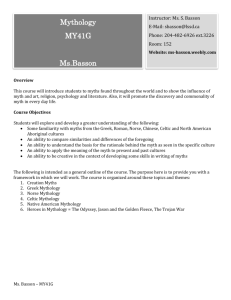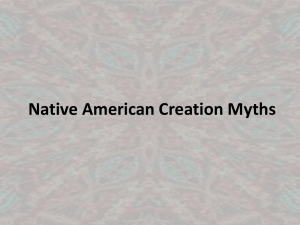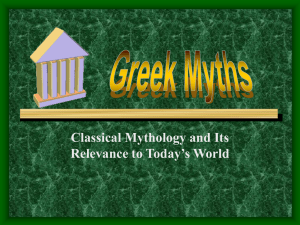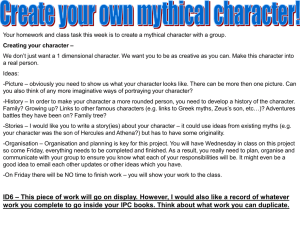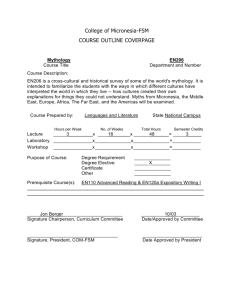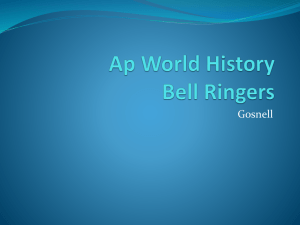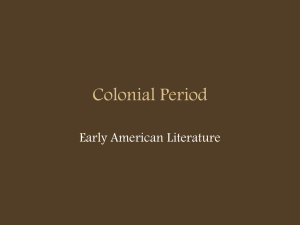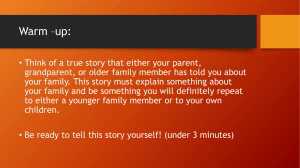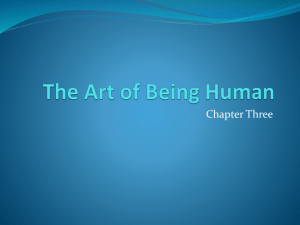Differentiated Methods of Instruction
advertisement
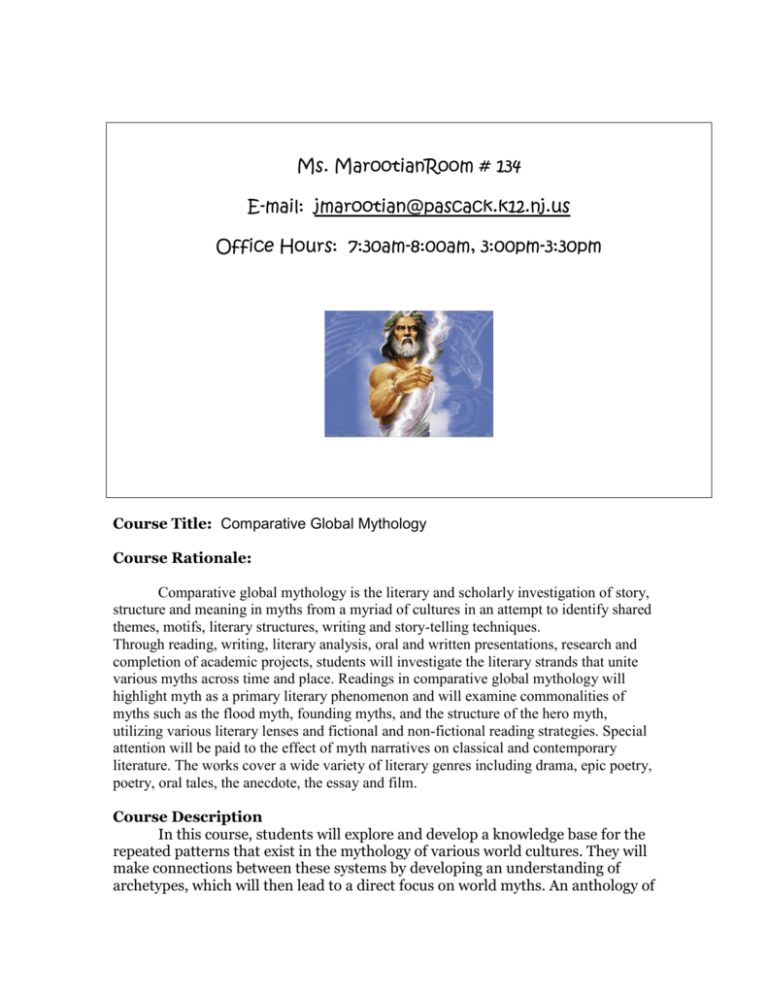
Ms. MarootianRoom # 134 E-mail: jmarootian@pascack.k12.nj.us Office Hours: 7:30am-8:00am, 3:00pm-3:30pm Course Title: Comparative Global Mythology Course Rationale: Comparative global mythology is the literary and scholarly investigation of story, structure and meaning in myths from a myriad of cultures in an attempt to identify shared themes, motifs, literary structures, writing and story-telling techniques. Through reading, writing, literary analysis, oral and written presentations, research and completion of academic projects, students will investigate the literary strands that unite various myths across time and place. Readings in comparative global mythology will highlight myth as a primary literary phenomenon and will examine commonalities of myths such as the flood myth, founding myths, and the structure of the hero myth, utilizing various literary lenses and fictional and non-fictional reading strategies. Special attention will be paid to the effect of myth narratives on classical and contemporary literature. The works cover a wide variety of literary genres including drama, epic poetry, poetry, oral tales, the anecdote, the essay and film. Course Description In this course, students will explore and develop a knowledge base for the repeated patterns that exist in the mythology of various world cultures. They will make connections between these systems by developing an understanding of archetypes, which will then lead to a direct focus on world myths. An anthology of world mythology will offer a broad, comparative perspective on mythological themes, while the reading of some texts in their entirety will help us appreciate myths in their historical, literary and aesthetic contexts. The class will engage with basic mythological themes such as cosmogony, the flood, the hero/heroine and the trickster, the afterlife, and the apocalypse by focusing on the concept of deity in different traditions ranging from Greek and Roman mythology, to Babylonian and Egyptian myths, as well as Indian, African, Middle Eastern, and Native Northern American. Students will analyze the stories and trace parallel elements to show that human beings are remarkably alike in their principal values and concerns. This course illustrates the influence of these myths on the art, literature and culture of the modern world. Students will also continue to develop their writing skills and their use of the writing process. 3 Essential Course Questions: This class will work to answer the following essential questions: 1.How are archetypal patterns reflected across world cultures? 2. How does mythology reflect cultural beliefs? 3.How have archetypes in myths transcended time and remained constant in human existence? ASSESSMENTS: The summative assessments designed for this class include but are not limited to: Archetypal Analysis Exams Original Analytical Essays Original Creation Myth (College Essay) Original Monomyth Literature Circle Book Talk Presentations Journals Daily classroom activities Socratic Seminar Discussions Final Project/Presentation Units of Study: Unite One: Introduction to Myth Unit Two: Myths of Creation Unit Three: The Hero’s Journey Unit Four: Monsters and Tricksters Unit Five: Female as Creator and Destroyer Unit Six: Healing and Sickness Unit Seven: Death and the Afterlife Readings for the year include, but are not limited to: Student selected independent reading pieces Fiction and non-fiction readings Blog/Opinion Pieces Persuasive pieces Poetry and short story selections Differentiated Methods of Instruction: These are just a sampling of what you can expect in my classroom over the course of the year Formal/informal PPT lecture with discussion Large and small group discussion Socratic Seminar discussions and debates Journaling and writing assignments Analysis of literature and art pieces 1:1 student conferences over writing assignments Everyday use of technology to enhance discussion Vocabulary and grammar enrichment Skills Learned: 1. Students will examine written text on a series of different levels. Here are some questions to consider: What is the historical context and background to the novel? What is the author’s purpose? What are some of the literary devices or tools that the author uses to create an interesting and enduring work of literature? What can we learn about the human condition through our readings? 2. Students will begin to understand all of the steps involved in writing an intellectual paper analyzing a work of literature: Close reading and analysis methods (including Sign Post strategies) Planning-outlining paragraphs Drafting and editing Adding direct quotes from the work to support thesis statements Adding a works cited page and crediting primary and secondary sources Completing a final product that is well organized, thoughtful and uses correct grammatical, spelling and punctuation conventions. Students will also become familiar with new vocabulary and its correct spelling and usage. Students will work on organizational skills and independence in learning through the upkeep of an English binder and online folders. Guidelines for Success 1. 2. 3. 4. Arrive on time with what you need to succeed. Open your mind to new learning. Everyone has the right to learn. Understanding takes work and time. Classroom Expectations 1. 2. 3. 4. 5. Be respectful of people, things, and ideas. Listen attentively; contribute appropriately. Be kind…no put-downs. Stay on task. Be prepared for class. Essential Materials: Mac Laptop & Case Laptop Charger Blue or black pen #2 Pencils Highlighters An English binder with college ruled paper to keep tangible handouts organized Grading Policy: The course is run on a “total points” grading system. Each quarter there is total number of points to be earned. All grades will be made available in a timely fashion. Allow 2-3 days for quizzes and tests and up to 1 week for essays. Gradebook will be open all year for you and your parents to access. Main values listed below: Homework and “DoNow” =5-10 points Quizzes (announced or unannounced) = 10-30 points Written Essays and Tests= 50 points Long Term Research/Writing Projects = 100 points Participation Grade = 30 points/quarter Independent Reading Assignments= 50 points/quarter Additional point values (TBA as they get assigned) Example: The more points you earn, the higher your grade will be. If you earn 573 points out of 650 possible points, then you will receive: 573/650= 88% (B+) Students will be assigned a letter grade each marking period. Letter grades are assigned as follows: A+ A 100- 9798 93 A- B+ B 9290 8987 8683 B8280 C+ C C- D+ D D- F 7977 7673 7270 6967 6663 6260 59> Signature of Acknowledgement: ___________________________________________________

